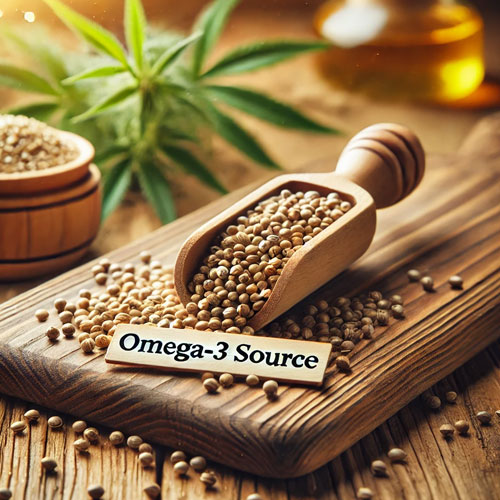Omega-3 fatty acids are essential nutrients that offer numerous benefits of omega-3, such as enhancing heart health, reducing inflammation, and supporting brain function[1]. This blog overviews the best omega-3-rich foods, including fish, seafood, plant-based, and fortified options suitable for different dietary preferences. We will also discuss how to incorporate these foods into your daily meals and the benefits of omega-3 supplements.
Key Takeaways
- • Omega 3 fatty acids are crucial for heart, brain, and overall health.
- • Fish like salmon and mackerel provide the most bioavailable sources of EPA and DHA.
- • Plant-based options such as chia seeds and flaxseeds are rich in ALA and suitable for vegetarians and vegans.
- • Fortified foods and supplements offer additional ways to meet omega-3 requirements.
Understanding Omega 3 Fatty Acids
Omega-3 fatty acids are polyunsaturated fats critical for the body’s overall health[2]. The three main types are:
Types of Omega 3s
- 1. ALA (Alpha-Linolenic Acid): Found in plant-based sources like chia seeds, flaxseeds, and walnuts. The body needs to convert ALA to EPA and DHA, though the conversion rate is low[3].
- 2. EPA (Eicosapentaenoic Acid): Present in fish and seafood, EPA is particularly beneficial for cardiovascular health and has anti-inflammatory properties[4].
- 3. DHA (Docosahexaenoic Acid): Also found in fish, seaweed DHA is essential for brain health and development and is especially important for pregnant women[5][6].
Benefits of Omega-3
- • Heart Health: Omega 3s can lower triglycerides, reduce blood pressure, and improve cholesterol levels[7].
- • Brain Function: DHA is crucial for cognitive function and vital for infants’ brain development [8].
- • Inflammation Reduction: Omega 3s have anti-inflammatory properties that can help with arthritis and other inflammatory conditions[9].
- • Support During Pregnancy: Omega 3, especially DHA, is essential for foetal brain and eye development[10].
Fish and Seafood: High Omega 3 Foods
Fish and seafood are excellent sources of EPA and DHA, providing some of the most bioavailable forms of omega-3 fatty acids. Here’s a closer look:
1. Salmon
Salmon is a rich source of EPA and DHA, offering around 2.2 grams per 100 grams, making it one of the best omega-3-rich foods[11]. It also contains high levels of vitamin D, which is crucial for maintaining bone health. Including grilled or baked salmon in your meals, adding it to salads, or even enjoying it smoked are great ways to benefit from its nutrients.

2. Mackerel
Mackerel provides an impressive 2.3 grams of omega 3 per 100 grams, making it one of the most potent sources of EPA and DHA[12]. It is also high in vitamin B12, which supports nerve health and helps in red blood cell formation. You can enjoy mackerel smoked or pan-fried with herbs, adding it to salads or as a main dish with vegetables.

3. Sardines
Sardines offer about 1 gram of omega 3 per 100 grams and calcium, supporting bone health[13]. These small, oily fish can be eaten straight from the can, added to pasta or salads, or served on whole-grain toast for a quick, nutrient-packed meal.

4. Seabass
Seabass contains approximately 0.7 grams of omega 3 per 100 grams and is also rich in selenium, an antioxidant that supports immune function. Baking or grilling seabass with a touch of lemon and herbs makes for a delicious and healthy meal.
5. Oysters
Oysters provide 0.4 grams of omega 3 per 100 grams[15] and a high amount of zinc, which plays a vital role in immune health. Oysters can be enjoyed raw with a squeeze of lemon or grilled for a richer flavour, offering a unique and nutritious meal.
6. Shrimp
Shrimp contains about 0.03 grams of omega 3 per 100 grams[16]. It is also high in lean protein, making it an excellent low-calorie food option. Shrimp can be added to stir-fries, pasta dishes, salads, or simply sautéed with garlic for a quick and easy meal.
Plant-Based Omega 3 Sources
For those following a vegetarian or vegan diet, several omega-3 vegetarian food sources offer ALA, the plant-based form of omega-3:
1. Chia Seeds
Chia seeds are among the top omega-3 vegan foods, with around 5 grams of ALA per ounce[17]. They also provide a high amount of dietary fibre, which supports digestion. Chia seeds can be added to smoothies, yoghurt, or oatmeal and can be used to make chia pudding, making them an easy addition to any meal.
2. Flaxseed Oil
Flaxseed oil provides about 7 grams of ALA per tablespoon (15 ml) and is rich in lignans with antioxidant benefits[18]. You can drizzle it on salads, add it to smoothies, or use it in dressings for a quick omega-3 boost.
3. Walnuts
Walnuts provide about 2.5 grams of ALA per ounce serving and a high level of antioxidants that promote heart health[19]. Walnuts are great as a snack, added to salads, or mixed into baked goods, offering flavour and nutrition.

4. Hemp Seeds
Hemp seeds contain around 2.6 grams of ALA from 3 tablespoons and are also a good magnesium source, supporting muscle and nerve function[21]. Sprinkle hemp seeds over salads, add them to smoothie bowls, or blend them into dressings for a simple way to boost omega-3 intake.
5. Seaweed
Seaweed, particularly algae, is one of the few plant-based sources that provide EPA in small amounts[22]. It is also rich in iodine, an essential mineral for thyroid function. Seaweed can be used in soups, salads, or sushi, and dried seaweed snacks are an easy way to get your omega-3s on the go.
Fortified Foods
Fortified foods provide another avenue to increase your omega-3 intake, especially if you’re not consuming enough fish or plant-based sources:
1. Omega 3-Enriched Eggs
These eggs come from hens fed omega-3-rich diets, resulting in higher DHA levels[23]. They are also a good source of protein, making them a convenient way to add omega-3 to your diet. Include these eggs in your breakfast by making scrambled eggs or omelettes or adding them to your baking.
2. Dairy Products
Some dairy products, like milk and yoghurt, are fortified with omega-3 fatty acids, calcium, and vitamin D[24]. Using these products in your breakfast cereal or as a snack provides an easy way to boost your omega-3 intake while benefiting from other essential nutrients.
Incorporating Omega 3 Foods into Your Diet
Adding omega-3 foods to your daily meals is simple with the right approach:
- • Breakfast: Start your day with omega 3-enriched eggs, chia seed pudding, or flaxseed in your porridge.
- • Lunch: Prepare a salad with grilled salmon or mackerel. You can also add walnuts or hemp seeds to enhance the omega-3 content.
- • Dinner: Grill seabass with a side of steamed vegetables or make a shrimp stir-fry. Add kidney beans to a chilli or seaweed salad for vegetarian options.
- • Snacks: Keep walnuts or omega-3-fortified yoghurt on hand for easy snacking.
- • Smoothies: Blend chia seeds, flaxseeds, or hemp seeds into your smoothies for a simple omega-3 boost.
- • Baked Goods: Incorporate ground flaxseeds or walnuts into muffins, bread, or energy bars.
These options provide a variety of ways to include omega-3 foods in your diet, ensuring you meet your daily intake needs.
Omega-3 Supplements
Supplements can be a practical alternative if you find it difficult to consume enough omega-3 foods. At Nature Fix, you will find high-quality omega-3 supplements from trusted brands, offering reliable sources of EPA and DHA to support your health.
Conclusion
Omega 3 fatty acids offer a range of health benefits, including improved heart function, cognitive support, and inflammation reduction. Incorporating high omega-3 foods like fatty fish, plant-based sources, and fortified products into your diet can help you achieve these health benefits. For those needing additional support, Nature Fix offers the best omega-3 supplements from a variety of reputed brands to help you meet your dietary requirements.
FAQ
1. What are the symptoms of omega-3 deficiency?
Omega 3 deficiency can lead to fatigue, poor concentration, dry skin, joint pain, and mood disturbances[25]. Severe cases may impact cardiovascular health[26].
2. Why is omega 3 important for women?
Omega 3 for women is particularly important during pregnancy and breastfeeding, as it supports foetal brain development[27]. It also helps reduce inflammation and supports heart health.
3. Can vegetarians and vegans get enough omega-3 from their diet?
Yes, plant-based sources like chia seeds, flaxseeds, and algae supplements can provide sufficient omega 3, though vegetarians may need to rely on algae-based supplements for EPA and DHA.
4. Are omega-3 supplements safe for children?
Yes, omega-3 supplements are generally safe for children and can aid brain and eye development[27]. Always consult a healthcare professional before starting any supplement.
References:
1 – https://www.medparkhospital.com/en-US/lifestyles/omega-3-health-benefits-of-nutrition
2 – https://my.clevelandclinic.org/health/articles/17290-omega-3-fatty-acids
3 – https://www.healthline.com/nutrition/3-types-of-omega-3
4 – https://ejim.springeropen.com/articles/10.1186/s43162-023-00265-6
5 – https://pmc.ncbi.nlm.nih.gov/articles/PMC4772061/
6 – https://www.mountsinai.org/health-library/supplement/docosahexaenoic-acid-dha
7 – https://my.clevelandclinic.org/health/articles/17290-omega-3-fatty-acids
8 – https://pmc.ncbi.nlm.nih.gov/articles/PMC3738999/
9 – https://pmc.ncbi.nlm.nih.gov/articles/PMC7362115/
10 – https://pmc.ncbi.nlm.nih.gov/articles/PMC3262608/
11 – https://fdc.nal.usda.gov/fdc-app.html#/food-details/175167/nutrients
12 – https://fdc.nal.usda.gov/fdc-app.html#/food-details/175119/nutrients
13 – https://fdc.nal.usda.gov/fdc-app.html#/food-details/175139/nutrients
14 – https://fdc.nal.usda.gov/fdc-app.html#/food-details/175142/nutrients
15 – https://fdc.nal.usda.gov/fdc-app.html#/food-details/1099132/nutrients
16 – https://fdc.nal.usda.gov/fdc-app.html#/food-details/175179/nutrients
17 – https://fdc.nal.usda.gov/fdc-app.html#/food-details/170554/nutrients
18 – https://www.mountsinai.org/health-library/supplement/flaxseed-oil
19 – https://health.clevelandclinic.org/health-benefits-of-walnuts
20 – https://fdc.nal.usda.gov/fdc-app.html#/food-details/170148/nutrients
21 – https://fdc.nal.usda.gov/fdc-app.html#/food-details/170148/nutrients
22 – https://fdc.nal.usda.gov/fdc-app.html#/food-details/168458/nutrients
23 – https://www.eggs.mb.ca/about-eggs/types-of-eggs
24 – https://www.webmd.com/diet/what-to-know-about-fortified-foods
25 – https://www.sakraworldhospital.com/symptom-detail/omega-3-deficiency-symptoms
26 – https://www.healthline.com/nutrition/omega-3-deficiency
27 – https://americanpregnancy.org/healthy-pregnancy/first-year-of-life/omega-3-supplements-baby/






